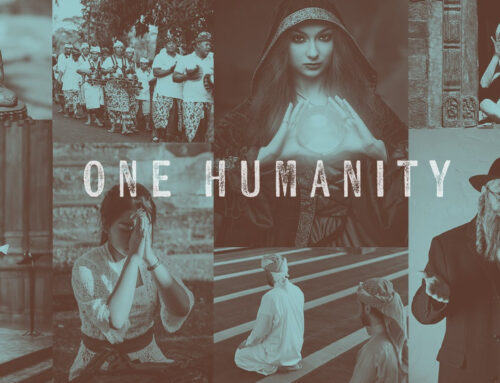No individual, no matter their age, the way they prefer to identify their belief in God, in Christ — evangelical, progressive, or by denominational descriptor rather than a disciple of the Lord Jesus Christ, a true child of God can serve two masters, be true to multiple faiths and beliefs.
We each either have Jesus Christ preeminent in our life, sufficient in our life while knowing, understanding, and believing the very basic instruction in the inerrant infallible Word of God, or we have our minds, our hearts, our love divided and we love this world and believe and follow its lies and delusions.
No one no matter who can worship the earth and also worship God. Worshipping the creation above the Creator is paganism. Idolization. Alien to being any sort of faithful to God person let alone a Christian.
This evidence found below, in the Pew Research Center information, reveals a divided mind and heart among young individuals professing to be evangelical Christians.
We are TO BE GOOD STEWARDS OF THIS EARTH. Not to worship the earth. To tend to as good stewards this wondrous and amazing creation the Good Lord has made for us. But to worship it? To vainly, foolishly begin to believe we are to save this earth? That belief within a true Christian cannot exist.
Why? Because it reveals a complete and utter lack of knowledge and understanding of God’s Word. A clear indicator of lacking Bible fluency, literacy, and understanding. Not knowing the hows and whys of everything. Of why God came to earth as fully truly man in Jesus, Of how it all ends.
God is Sovereign. God is in control.
Not man or woman. Not any man, any woman, any group of men or women, nor any government or manmade edict, disctate or law.
Our recycling, our turning green rather than turning evermore to the Word of God and the Lord, our obsession with electric vehicles, damning fossil fuels and cows and cheeseburgers and thinking we can plant our way out of the sin and evil we embrace and embolden by plating tress is utter rubbish, utter nonsense, utter foolishness and reveals a further and deepening blindness in people, especially this professing to be Christians.
Have you read THE BOOK? Did you happen to read THE ENDING? Do you believe it? Understand it? Really?
We cannot save this earth. We can only submit to God and turn to Him and His Son, the Lord Jesus Christ in faithfulness and obedience permitting the free gift of grace from God to save us!
Yes, be very good stewards of this wonderous and beautiful earth, created by God for us.
But do not become confused. Do not misplace your hearts and minds. Do not think for an instant we can save this earth and that climate change is going to destroy this earth.
Man and woman’s sin and evil hearts and minds, our turning from God, our turning from Christ, our mocking and discrediting God, the Lord Jesus Christ, the Holy Spirit, and the Holy Bible bring about the destruction of this earth.
Not cows. Not V-8 engines. Not plastic straws. Not using green woods. Not recycling. Not wind turbines.
Our increasing sin and evil, our being given over to wickedness and turning from God bring about THE END.
As clearly, easily understood within THE BOOK. The Holy Bible.
If only professed Christians, and others, would read it, study it, meditate — think deeply on it — and BELIEVE IT!
Ken Pullen, A CROOKED PATH, Monday, April 24th, 2023
Younger evangelicals in the U.S. are more concerned than their elders about climate change
Reprinted from Pew Research Center
RELATED VIDEO FOLLOWING THIS ARTICLE
Young people around the world have been at the forefront of climate change protests, and in the United States, adults under 40 are considerably more likely than their elders to express concern about the issue and attribute it to human activity.
This age pattern also exists within major Christian traditions in the U.S., including evangelical Protestants, who are among the groups most skeptical about climate change.
Overall, two-thirds of U.S. adults younger than 40 say global climate change is an extremely or very serious problem, compared with roughly half of those ages 40 and older (52%), according to a recent Pew Research Center survey. Furthermore, 64% of adults under 40 say the Earth is getting warmer mostly because of human activity, such as burning fossil fuels, while fewer than half of older Americans (47%) take that position.
There are similar age gaps among evangelical Protestants, even though both younger and older evangelicals are less likely than Americans overall to express concern about climate change. Evangelical Protestant adults under 40 are more likely than older evangelicals to say climate change is an extremely or very serious problem (41% vs. 31%). And 42% of evangelical adults under 40 say the Earth is warming due to human activity, compared with 28% of evangelicals ages 40 and older.
These age gaps are not unique to evangelicals. For instance, around two-thirds of U.S. Catholic adults under 40 (66%) say the Earth is warming because of human activity, while half of older Catholics share this view. Among religiously unaffiliated Americans – a group that is more concerned than Christians as a whole about climate change – young people again are especially concerned. (The survey did not include large enough samples of members of non-Christian groups to analyze age categories within them.)
Views toward climate change are even more closely tied to political party than to religion or age, with Democrats and Democratic-leaning independents much more likely than Republicans and Republican leaners to express high levels of concern. Still, among Republicans, adults under 40 are considerably more likely than those ages 40 and older to say that climate change is an extremely or very serious problem (35% vs. 21%) and that the Earth is getting warmer mostly because of human activity (38% vs. 19%). The age gap is not as pronounced among Democrats, with large majorities of both younger and older Democrats expressing these views.

Few young adults are both highly religious and concerned about climate change
While young adults in the U.S. tend to be more concerned about climate change than adults ages 40 and older, they also tend to be less religious than older Americans. These crosscutting patterns show up when examining the percentage of young Americans who are both highly religious and concerned about climate change.
Just 5% of U.S. adults under 40 are both highly religious and concerned about climate change, compared with 9% of those ages 40 and older. (In this study, “highly religious” is defined as those who say they pray each day, attend religious services at least weekly and consider religion to be very important in their lives.)

Adults under 40 are far more likely than older Americans to both have a low level of religious commitment and be concerned about climate change. This is true for 27% of U.S. adults ages 18 to 39 – about double the share of those ages 40 and older in this category (13%).

Young Americans are less likely than their elders to hold some beliefs that connect religion to the environment. For instance, while 55% of Americans under 40 say they completely or mostly agree with the idea that God gave humans a duty to protect and care for the Earth, 72% of adults 40 and older say the same. Younger Americans also are less likely than their older counterparts to say they have prayed for the environment in the past year (27% vs. 37%). These gaps exist in part because young Americans are less religious in general, including being less likely to believe in God and to pray on a regular basis.
Among evangelical Protestants, however, differences between younger and older adults on these questions are modest. Eight-in-ten or more evangelical adults under 40 (82%) and ages 40 and older (88%) say God gave humans a duty to care for the Earth, while similar shares of both groups say they have prayed for the environment in the past 12 months (41% and 44%, respectively).
SEE THE RELATED VIDEO BELOW…
RELATED:







Leave a Reply, please --- thank you.